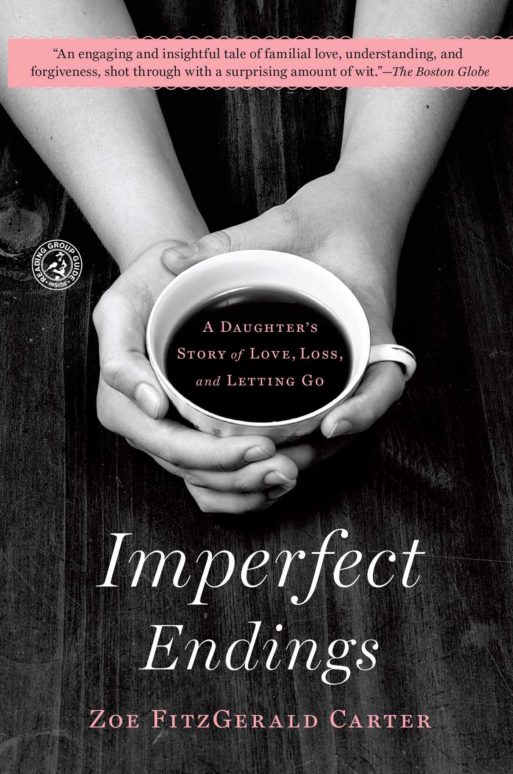 Zoe Carter’s busy life on the West Coast with her husband and daughters and an unfinished mystery novel are put on hold when her glamorous and stubborn mother, Margaret, decides that it is time” to end things”. Margaret has been living with Parkinson’s disease for decades, and she is now bedridden and often relies on an oxygen machine to breathe. Since her husband’s death years earlier, she is living alone in Zoe’s childhood home in Washington, D.C., with caretakers and housekeepers to manage the essentials to keep life moving around her. The youngest of three daughters, Zoe has become her mother’s “favorite” over the years, and she is the one bearing the heaviest burden throughout this trying time as her mother faces the end-of-life, asking her daughters to be by her side at the end.
Zoe Carter’s busy life on the West Coast with her husband and daughters and an unfinished mystery novel are put on hold when her glamorous and stubborn mother, Margaret, decides that it is time” to end things”. Margaret has been living with Parkinson’s disease for decades, and she is now bedridden and often relies on an oxygen machine to breathe. Since her husband’s death years earlier, she is living alone in Zoe’s childhood home in Washington, D.C., with caretakers and housekeepers to manage the essentials to keep life moving around her. The youngest of three daughters, Zoe has become her mother’s “favorite” over the years, and she is the one bearing the heaviest burden throughout this trying time as her mother faces the end-of-life, asking her daughters to be by her side at the end.
In her memoir, Imperfect Endings, Carter presents a year of struggling not only with her mother’s impending death, but also with the legal and emotional issues of assisted suicide, with candor, humor, and a desperate introspection. Woven into the narrative are Zoe’s memories of her childhood, her father’s death years earlier, and the struggles she has faced throughout her life with her relationships with her sisters, her mother, and her late father.
Carter does an incredible job of engaging the reader with the reality of the events she faced and the emotions she experienced. As she points out throughout the book, assisted suicide is illegal where her mother lives, and regardless of her daughters’ beliefs about her decision, Margaret’s fantasy of peacefully ending her life with the girls at her side poses an enormous legal risk to Zoe and her sisters and their families. This clear legal issue pops up throughout the story, never letting the reader forget for long the debate that has arisen in this country surrounding the right to die.
Deeper than this, though, Carter delves into the emotional turmoil that her family was thrust into because of her mother’s decision, a part of the right-to-die issue that easily slips our minds when we consider the philosophical and libertarian facets of it. I picked up a book expecting to read a narrative about a mother’s choice to die, but what I found was a an exploration of a daughter’s relationship with her mother, her sisters, her husband, her daughters, her father, and herself. With a few vignettes set in the past, Carter skillfully paints the picture of her family and draws the reader in to wonder the whole time how the story will end.
Certainly the reader will wonder throughout the book, as most of the characters do, Will Margaret actually take her own life in the end? As the woman continues to set and cancel dates for “the big day”, she jerks her family and the reader back and forth between pitiful sympathy and utter annoyance. Yet, in spite of a clear frustration at her mother’s ease with toying with the emotions of her loved ones, Carter’s depiction of Margaret is ultimately delicate and glamorous, a nod to the intrinsic respect between mother and daughter.
This memoir is a great read for anyone, whether interested in end-of-life issues, investigating the assisted suicide debate, grappling with family issues, or facing a major loss, or just looking for a good story. Though the concerns that Zoe grapples with throughout the book are very particular to her life, many of the book’s greater themes — family, death, forgiveness — are sure to resonate with any reader. Look beyond the events focused on the death of the mother, and this is most certainly a story about the life of the daughter.

 “Imperfect Endings”, by Zoe Fitzgerald Carter
“Imperfect Endings”, by Zoe Fitzgerald Carter


 Recovering Cremation Remains After the Los Angeles Fires
Recovering Cremation Remains After the Los Angeles Fires
 “As Tears Go By” by Marianne Faithfull
“As Tears Go By” by Marianne Faithfull
















